Pontoon boats are a popular choice for recreational boating, but when it comes to saltwater use, finding the right model requires special considerations. Saltwater environments are harsh on boats, and not all pontoons are built to handle the unique challenges posed by salt, such as corrosion and increased wear. In this article, we’ll explore how saltwater impacts pontoon boats, highlight the essential features for saltwater suitable pontoon boats, and provide recommendations on models that can stand up to the demands of coastal and open-water adventures.
How Does Saltwater Impact Pontoon Boats?
Saltwater can significantly impact a pontoon boat, primarily through the corrosive effects it has on the boat’s materials, especially metals like aluminum. Saltwater accelerates corrosion, particularly for aluminum and other metals commonly used in pontoon boat construction. This can lead to pitting and weakening of the pontoons and metal fixtures, which affects both the boat’s appearance and its structural integrity over time.
Saltwater can damage electrical systems due to increased conductivity, which raises the risk of short circuits and other electrical issues. Salt and moisture can degrade upholstery and fittings faster, leading to wear, fading, and mold growth.
Understanding these impacts can help prospective pontoon boat owners choose the right features to handle saltwater environments effectively.
Pontoon Boat Features For Saltwater
To withstand the previously explained harsh conditions of a saltwater environment, pontoon boats need specific features and materials that offer corrosion resistance, durability, and protection. Here are the essential features a pontoon boat must have for saltwater.
Corrosion-Resistant Materials
Saltwater corrodes untreated metals quickly, so the pontoons and structural components should be made of marine-grade aluminum (typically 5052 or 6061 alloys) with anti-corrosion coatings to resist salt damage. Opt for stainless steel (preferably 316-grade) screws, bolts, and other hardware for maximum rust resistance. Anodizing aluminum increases its corrosion resistance, making it an ideal finish for ladders, rails, fences, Bimini frames, cleats, and other metal components.
Saltwater-Resistant Paint or Powder Coating
Specialized saltwater-resistant paint or powder coatings on the hull, pontoons, and other exposed surfaces provide an additional layer of protection against saltwater corrosion and UV damage. The American Boat and Yacht Council (ABYC) recommends aluminum vessels have a protective paint coating to act as a barrier between the aluminum and saltwater.
Sacrificial Anodes
Zinc or magnesium anodes help prevent galvanic corrosion by absorbing the salt’s effects, acting as a sacrificial layer so that the rest of the boat’s metal surfaces remain intact. The zinc or magnesium anode will erode during the galvanic corrosion process rather than the aluminum. Hence the term sacrificial anode.
Under Deck Shielding
Placing anti-corrosion shields or panels on the deck’s underside can reduce saltwater spray, protect wiring, and keep saltwater off vulnerable areas. Applying anti-fouling paint on the bottom of the pontoons can help prevent marine growth, which is more prevalent in saltwater.
Saltwater-Treated Outboard Engine
Engines with specific anti-corrosion coatings, stainless steel components, and freshwater flushing options are vital for saltwater performance. Many saltwater-specific engines come with built-in flush systems that allow users to rinse out salt and debris after each use.
Vinyl or Rubber Decking
Marine carpet can trap salt and moisture, which accelerates corrosion. Saltwater pontoon boats should have non-absorbent flooring like marine-grade vinyl or marine rubber decking for easy cleaning and moisture resistance.
Sealed and Waterproof Wiring
To resist corrosion from salt exposure use sealed electrical components and use marine-grade wiring. Use marine-grade, waterproof electrical connectors to prevent saltwater intrusion into wiring systems.
UV-Resistant Upholstery and Coverings
High-quality, UV-resistant vinyl resists cracking and fading from prolonged exposure to the sun and salt air. A high-quality pontoon boat cover made from mildew and UV-resistant material protects the boat’s interior from the salt air when not in use.
Regular Maintenance
Regular maintenance is more critical for pontoon boats in saltwater. Rinsing the boat thoroughly after each outing and applying anti-corrosion coatings to metal surfaces are essential steps to prevent damage and prolong the boat’s life.
Saltwater Pontoon Boat Manufacturers
Pontoon boat manufacturers have decided to specialize specifically in saltwater pontoon boats or to have a saltwater “package” for some of their boat models. The following list of pontoon boat manufacturers have gone the extra mile to to create pontoon boats that incorporate all of the previously mentioned features. These features, do not make pontoon boats “immune” from saltwater. We still recommend covering the boat when not in use, and giving it a freshwater rinse after every outing.
Bennington Saltwater Pontoon Boats
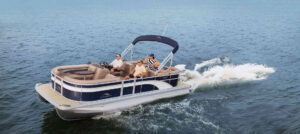
Bennington is one of the best manufactures of saltwater pontoon boats. They have managed to stay in the pontoon business for over 20 years. Not only are their saltwater pontoon boats affordable but their boat interiors are created for comfort and have a long life span. Most of their saltwater pontoon boats have a fuel load range of 16 gallons+ and can hold the minimum weight of 370 pounds with an excellent width and length. Bennington carries a “saltwater series” – that are made specifically to go into saltwater and withstand saltwater over time.
Berkshire Saltwater Pontoon Boats
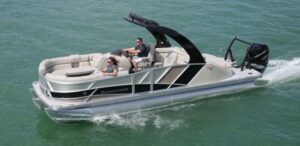
Berkshire is an another saltwater pontoon boat manufacturer that has managed to stay in the competitive industry by making their pontoon boats more affordable and more family friendly with enough room to accommodate many at once. They sell “saltwater edition” pontoon boats for all of their models that includes cathodic protection for the boat and allows you to enjoy the saltwater for years in your pontoon!
Fiesta Saltwater Pontoon Boats
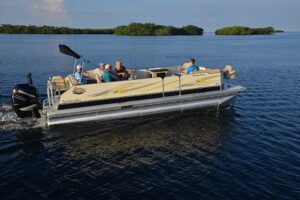
Fiesta Marine is a saltwater pontoon boat manufacturer that specifically focuses on manufacturing saltwater pontoons or Saltwater friendly boats. They’re not as big as most of the other pontoon boat manufacturers but they’re known to satisfy their customers needs and services, making them an excellent manufacturer.
BeachCat Saltwater Pontoon Boats
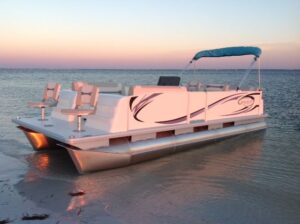
BeachCat saltwater pontoon boats bring both luxury and great performance. They have a wide range of saltwater pontoon boats that are on the higher end of the price range but you pay for what you get. They are a very high quality boat and they are made to be on the ocean.
Cypress Cay Saltwater Pontoon Boats
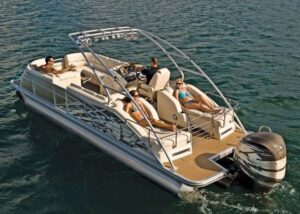
Cypress Cay is not known as a saltwater pontoon boat manufacturer but their features and designs have helped them stay on the market for a longer time than most pontoon boat manufacturers. They have saltwater packages for their pontoon boats, and it helps them withstand anything saltwater can throw at them.
Conclusion
In conclusion, choosing the right pontoon boat for saltwater use requires careful consideration of durability, materials, and maintenance needs to withstand the harsher marine environment. By focusing on corrosion-resistant features such as anodized aluminum, stainless steel fittings, and reinforced hulls, you can enjoy a boat that stands the test of time. Regular upkeep, including thorough rinsing after each use and applying anti-corrosion treatments, will extend the life of your investment and keep it performing optimally. With the right model and proper care, a saltwater-friendly pontoon can offer years of enjoyment on the open water, bringing you closer to the adventure and relaxation that a marine lifestyle provides.